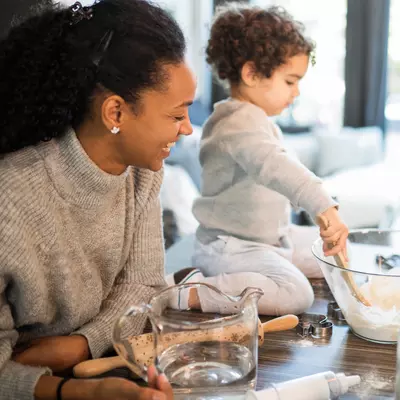- AdventHealth

Pneumonia. It sounds serious, and it is.
According to the Centers for Disease Control and Prevention (CDC), annually, pneumococcal pneumonia affects about 900,000 Americans, leads to 400,000 hospitalizations and causes death in five to seven percent of those affected. Adults account for the majority of these numbers.
And among the elder populations, the risks of pneumococcal pneumonia are much higher. It is one of the main causes of hospitalization in seniors ages 65 and older.
Dr. Ailis Marrero, MD, family medicine physician at AdventHealth Medical Group, Connerton Family Medicine in Land O Lakes, explains, Chronic conditions, frailty, weakened immune systems and group living environments such as assisted living or nursing homes put our seniors at a higher risk for pneumonia, which can severely impact their health. So, it's important to know pneumonia risks and warning signs in aging populations, and take proven steps to prevent it.
The good news is that everyone can do something. So, keep reading on.
Pneumonia: Know the risks
Dr. Marrero explains that while some viruses can cause pneumonia, most cases of pneumonia are bacterial.
Pneumonia is a highly communicable disease that is transmitted by airborne pathogens and direct contact with infected coughing secretions. It is most contagious in the beginning stages of the illness and is easily passed from person to person, especially in crowded or communal living conditions.
She outlines some reasons why seniors are most at risk:
Frailty
Aging can lead to a general decrease in muscle strength and a decline in the body's overall function. This can make one more susceptible to stressors and increase the risk for adverse health outcomes.With general muscle weakness, elders are often unable to clear secretions from the lungs (from illness, aspiration of oral bacteria or food, and even stomach contents from GERD (gastroesophageal reflux disease)). It is this inability to clear mucous or other elements from the lungs that increases pneumonia risk.
Weakened immune systems
A weakened immune system is a natural part of aging. So, no matter how healthy, seniors are more at risk for diseases like pneumonia because they may have a harder time fighting off the infections. Seniors are often taking medications that can further compromise the immune system, like steroids and chemotherapy.
Chronic conditions
Many seniors have chronic conditions, including diabetes, Parkinson's disease, Alzheimer's disease, dementia and heart disease, which increase their risk for developing pneumonia. And if the chronic conditions are not well controlled, one has a lung condition like asthma or COPD (chronic obstructive pulmonary disease), or is exposed to cigarette smoke, the risks are even greater.
Some conditions further weaken the immune system, or require medications that have the same effect; other conditions can mask some of the common symptoms of pneumonia, so managing seniors overall health plays an essential role in pneumonia prevention, says Dr. Marrero.
Senior environments
Because pneumonia is an infectious disease, seniors environments can put them at risk. Living in group care settings can increase exposure to the disease-producing agents that cause pneumonia, says Dr. Marrero.
In addition, there are peak times of concern that could pose more pneumonia risks, including during the flu season (which in Florida tends to be year-round), during the holiday season when larger groups of people are together and at times when travel becomes more popular.
Dr. Marrero says, If you are a caregiver, close family member or know that you'll be around a senior loved one, you can do three important things to help protect them: know the signs of pneumonia, encourage elders in your family to get their recommended vaccinations and get yours, too.
Signs of pneumonia in elders
While typical symptoms of pneumonia often present as a cough, fever, chills, rapid or difficulty breathing and/or chest pain, aging populations often don't present in the same way, so it's important to be aware of atypical symptoms, advises Dr. Marrero.
She explains that elders with pneumonia might not have a fever or a significant cough because of general frailty or other conditions that can mask these symptoms. That said, pneumonia could present as something as simple as feeling tired, confused, not being engaged in usual activities or not wanting to eat.
For caregivers and family members, it's very important to recognize these symptoms and help your elder get a medical evaluation immediately.
How to prevent pneumonia in elders
For those ages 65 and up, there are two recommended pneumococcal vaccines. They are administered at least one year apart upon turning 65 years of age; however, some subgroups of people can benefit from these vaccines earlier, including those with diabetes, COPD, compromised immune systems, cancer, etc.
The annual flu vaccine is also important for pneumonia prevention in seniors, and is recommended for most people ages six months and up.
It's important to help the elders in your life to understand that vaccinations are the best and safest ways to protect their health (there is no possible way to get the actual illness from the pneumococcal and flu vaccines). You can also support them in keeping track of their vaccination dates and getting to and from appointments, says Dr. Marrero.
In addition to vaccinations, Dr. Marrero recommends some additional pneumonia prevention tips.
1. Oral hygiene
Its often not thought about, but helping seniors keep up with their oral hygiene can help prevent pneumonia, because due to a poor gag reflex related to aging, bacteria from the mouth can be silently aspirated and seniors might have a hard time coughing it up. As a result, it can settle into the lungs and increase pneumonia risk.
2. Managing acid reflux
Some seniors have acid reflux or GERD, which can cause acid contents from the stomach to come up into the esophagus and be aspirated into the lungs. So, helping seniors control reflux is important for their lung health, too.
3. Hand-washing
Because pneumonia is an infectious disease that is transmitted through secretions, it's important for everyone to practice proper hand-washing precautions. This is especially true if you are a caregiver or family member who will be in close contact with a loved one at risk.
4. Limit exposure to smoke
Smoking can irritate the lung tissues, trigger asthma and create more mucus in the lungs. That's why its key to limit elders contact with cigarette smoke and keep their lungs as healthy as possible.
When we think about our elders, we have to consider that their health needs are different we have to be proactive about their needs and extend extra compassion. If you have been ill, don't visit an elderly family member until you are well again, get your vaccinations as recommended by your doctor and reach out with a helping hand if an elder in your life needs some extra support, concludes Dr. Marrero.
Learn more about Dr. Marrero and AdventHealth Group, Connerton Family Medicine.


